Karl Bülowius
Karl Robert Max Bülowius (2 March 1890 – 27 March 1945) was a German Army officer who served during the First World War and the Second World War. He also served eleven non-consecutive years for the Weimar Republic during the interwar period which began in 1919 and ended on September 1939.
Karl Robert Max Bülowius | |
|---|---|
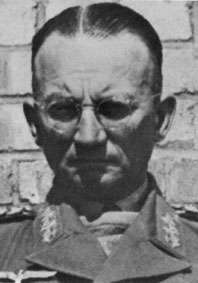 Karl Bülowius as he appears before a candid photo shot. Judging by the uniform, it was taken sometime between 1942 and 1943. | |
| Born | 2 March 1890 Königsberg, Province of East Prussia, Kingdom of Prussia, German Empire now Kaliningrad, Kaliningrad Oblast, Russia 54.715102°N 20.510101°E |
| Died | 27 March 1945 (aged 55) Camp Forrest (near Tullahoma), Coffee County, Tennessee, USA 35.366096°N 86.063461°W, |
| Allegiance | |
| Service/ | Prussian Army Reichsheer Army |
| Years of service | 1908–20 (resigned in 1920) 1924–45 (committed suicide in 1945) |
| Rank | Lieutenant (Imperial German Army) Hauptmann (Imperial German Army) Generalmajor (Wehrmacht) Generalleutnant (Wehrmacht) |
| Unit | Division von Broich/von Manteuffel (During the North African campaign - World War II) |
| Commands held | First Army Corps (1915) 20th Army Engineer Battalion (1920) 8th Army Engineering Squad (October 23, 1939 – May 15, 1940) 9th Army Engineering Squad (May 15, 1940 – October 25, 1942) Panzer Army Africa Engineering Squad (October 25, 1942 – April 1943) Post Commander of Division Von Manteuffel (April 1943 – May 9, 1943) |
| Battles/wars | World War I
|
| Awards | Iron Cross (awarded twice) German Cross |
Life and career
Early life and World War I
Karl Bülowius was born on 2 March 1890 in Königsberg, Germany (now Kaliningrad, Russia).[1] He joined the Prussian Army on 26 November 1907 and became an officer cadet of the engineering troops (Fahnenjunker) where he would make his promotion to Leutnant (second lieutenant) on 19 June 1909.[1][2] Bülowius participated in the First World War, serving in various engineering departments of the German Army that were involved in military duties in both Europe and Palestine.[1][2] During the year 1918 (which would become the final year of the war), Bülowius was elevated to the rank of Hauptmann (captain).[1] The First World War would end six months later on 11 November with a defeat for Germany and her allies - limiting Germany's army to 100000 men[3] until Adolf Hitler broke the Treaty of Versailles fifteen years later. He was relieved from the Army on December 31, 1920[2] due to unfortunate circumstances surrounding the structure of Germany's post-World War I military.
However, Bülowius returned to active military service on 1 June 1924. He would serve in various engineering and cavalry units of the Reichswehr during the 1920s and the 1930s.[1][4]
World War II and suicide
At the beginning of World War II, he commanded Oberbaustab X.[1] Bülowius became commanding officer (Pionierführer) of engineering parts of the 8th Army on 26 October 1939.[1] Success in commanding the 8th Army would result in Bülowius holding on the same post when he was transferred to the 9th Army on 15 May 1940.[1] Transferred to North Africa, Bülowius commanded the engineers of Panzer Army Africa on 25 October 1942. Between 17 and 25 February 1943, he commanded the entire group.[1] Bülowius held the position of post commander in von Manteuffel's former division on April 1943 and kept it until he was captured the following month.[1] Von Manteuffel had been evacuated back to Germany due to exhaustion and later sent to the Eastern Front on a promotion to Major General.[1]
He was captured by U.S. troops on 9 May 1943 near the end of the North African campaign.[1] The North Africa campaign would end seven days later on 16 May 1943 when the Axis (mostly containing troops from Nazi Germany and Fascist Italy) forces were forced to retreat to Southern Italy in a decisive defeat.[5] Bülowius finished his career in the German Heer component by committing suicide on March 27, 1945 at the prisoner-of-war camp named Camp Forrest in Coffee County, Tennessee, USA.[1] He is interred at the Chattanooga National Cemetery in Chattanooga, Tennessee, USA.
Credentials
Promotions
- Fahnenjunker – 26 November 1907
- Fähnrich – 18 August 1908
- Leutnant – 19 June 1909
- Oberleutnant – 18 June 1915
- Hauptmann (Captain) – May 1918
- Major – 1 April 1934
- Oberstleutnant – 1 August 1936
- Oberst – 5 January 1939
- Generalmajor – 1 April 1942
- Generalleutnant – 1 April 1943
Awards
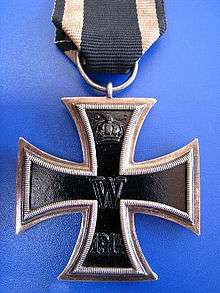
- Türkische Silberne Liakat-(Verdienst)-Medaille mit Schwertern
- Türkischer Eiserner Halbmond
- Königlich Bulgarische Tapferkeitsorden, IV. Klasse (II. Stufe)
- Ehrenkreuz für Frontkämpfer
- Wehrmacht-Dienstauszeichnung, IV. to I. Class
- Iron Cross (1939), 2. and 1. Class
- Kriegsverdienstkreuz (1939) II. und I. Klasse mit Schwertern
- Medaille "Winterschlacht im Osten 1941/42"
- Ärmelband "Afrika"

In fiction
Bülowius would make a "special guest appearance" in the Japanese video game Sgt. Saunders' Combat!. This officer is only seen during the North Africa campaign of 1942-43; particularly during the Tunisia Campaign. He holds the rank of Generalmajor in the game and can be killed by any Allied Forces unit.[6] In campaign mode, Bülowius can only be utilized by the AI opponent. He may be seen in other video games related to World War II that involve either the Eastern Front and/or the North Africa campaign.
Citations
Book
- Lannoy, Francois de; Josef Charita (2001). Panzertruppen: Les Troupes Blindees Allemandes German Armored Troops 1935–45. Heimdal. ISBN 2-84048-151-0.
- Neitzel, Sönke (2005). Abgehört - Deutsche Generäle in britischer Kriegsgefangenschaft 1942-1945. Propyläen. ISBN 3-549-07261-9.
Web
- "Karl Bülowius' information" (in French). Pagesperso-orange. Retrieved 2010-04-27.
- "Additional information about Karl Bülowius" (in German). Wehrmachtlexikon. Retrieved 2012-02-19.
- Treaty of Versailles, Part V at Wikisource.
- "Karl Bülowius' return to active military duty". Axis Biographical Research. Retrieved 2012-12-23.
- Playfair, p.460
- "Karl Bülowius' appearance in Sgt. Saunders' Combat! (Super Famicom video game)" (in Japanese). Keddy. Retrieved 2012-12-23.
External links
Images
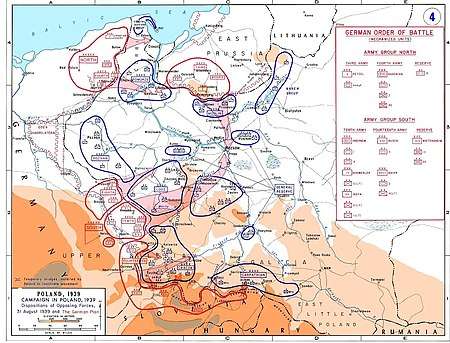 These were battle plans for the German invasion of Poland in 1939. Bülowius was considered to be a part of the 8th Army during that time.
These were battle plans for the German invasion of Poland in 1939. Bülowius was considered to be a part of the 8th Army during that time.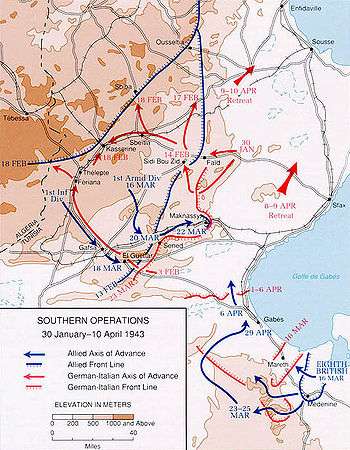 This was a strategic map from the Battle of Sidi Bou Zid; the last major battle that Bülowius participated in.
This was a strategic map from the Battle of Sidi Bou Zid; the last major battle that Bülowius participated in.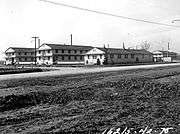 This would be the final sight that Bülowius would ever see of the outside world before committing suicide.
This would be the final sight that Bülowius would ever see of the outside world before committing suicide.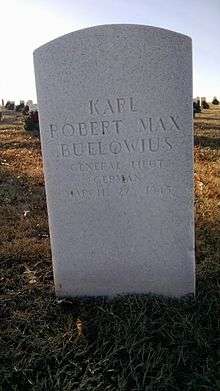 Image of the headstone of Generalleutnant Bülowius at the Chattanooga National Cemetery in Chattanooga, Tennessee, USA.
Image of the headstone of Generalleutnant Bülowius at the Chattanooga National Cemetery in Chattanooga, Tennessee, USA.
| Military offices | ||
|---|---|---|
| Preceded by Generalmajor Hasso von Manteuffel |
Commander of Division von Manteuffel 31 March 1943 – 30 June 1943 |
Succeeded by unit disbanded |